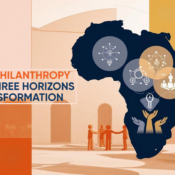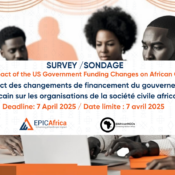Many internationally funded projects and programs delivered in Africa from an arm’s length had to pause or retreat during the uncertainty of the COVID-19 pandemic’s early days, but locally based civil society organizations had no choice but to remain. At times, these CSOs were the only safety net available to communities in need of the most basic amenities, filling the gap as the economic and social fallout of the crisis wracked the continent.
The pandemic has emphasized many societal inequities, and philanthropic global giving has not been exempt. In many ways, COVID-19 has proved that existing models of philanthropic giving in global development and aid do not necessarily live up to its lofty ideals and that they do not lead to the changes often touted.
African CSOs shouldn’t need to wait for another crisis. Now is the time for things to change.
Despite being crowded out of access to global funding by large international organizations, CSOs are the backbone of African societies. Indeed, in a 2021 survey by EPIC-Africa and @AfricanNGOs, over 80% of participating African CSOs said they introduced new program activities to respond to the social and economic needs of the most vulnerable populations during the crisis.
At the same time, over 68% said they experienced a loss of funding since the start of the pandemic, up from about 56% in a 2020 survey, and fewer than 10% said they received any support through government emergency relief funds.
These findings are clear: Existing models of philanthropic giving exacerbate some of the pressures that CSOs face, hindering their ability to thrive and respond effectively to communities in crisis. Long-term under-resourcing and restricted civic space in many countries pre-date the pandemic but have put additional strain on the African CSO sector as it seeks to effectively support the continent’s economic recovery and build its capacity to react to this and future shocks.
African CSOs shouldn’t need to wait for another crisis. Now is the time for things to change. Increasingly, funders — philanthropic and otherwise — talk about systemic change and say they are listening to those they support, but what concrete steps can they take?
African CSOs say they face challenges in financial management, leadership, human resources, operations, and communications. These fundamental areas need to be supported to build up organizations’ long-term capacity, and that requires institutional — not project-based — support. Funders should trust African CSOs displaying transparency and credibility, fund them directly, and help build strong philanthropic infrastructure and organizations that can provide services and tools to meet the needs of local communities.
Shrinking civic space and limited interaction with formal government structures can limit the scope of many African CSOs. These organizations are still too easily dismissed on the continent because of a lack of strong, effective lobbying networks that can interact with government structures on an equal footing.
Ongoing efforts should build CSOs’ capacity to engage governments in a safe and effective manner. The sector needs support to organize, quantify its weight in societies and economies, and communicate its impact more broadly. African CSOs are clear that they seek long-term, flexible funding models that allow them to be most effective.
Research from our friends at Firelight Foundation suggests the same. The fund’s groundbreaking tools, developed with community-based organizations in eastern and southern Africa, provide clear and actionable guidance in a range of areas — from interacting with these groups to evaluation and learning — for funders to engage with African CSOs in ways that ensure support is meaningful and contributes to transformative change.
Localization, #ShiftThePower, and other movements calling to dismantle prevailing funding practices that marginalize African-led initiatives could be undermined without robust and locally rooted support infrastructure, leading to a return to the status quo.
CSOs across Africa are leading change, both within their own communities and nationally. They have credibility and their own expertise — and it is these two things that should form the basis of support. Funders should not wait for another pandemic to remind themselves that they can indeed be flexible. Africa’s economic recovery and the lives of millions of people depend on civil society organizations. CSOs and funders alike need to seize this moment to act.
Read the whole piece on DEVEX – the leading independent news organization covering global development.



